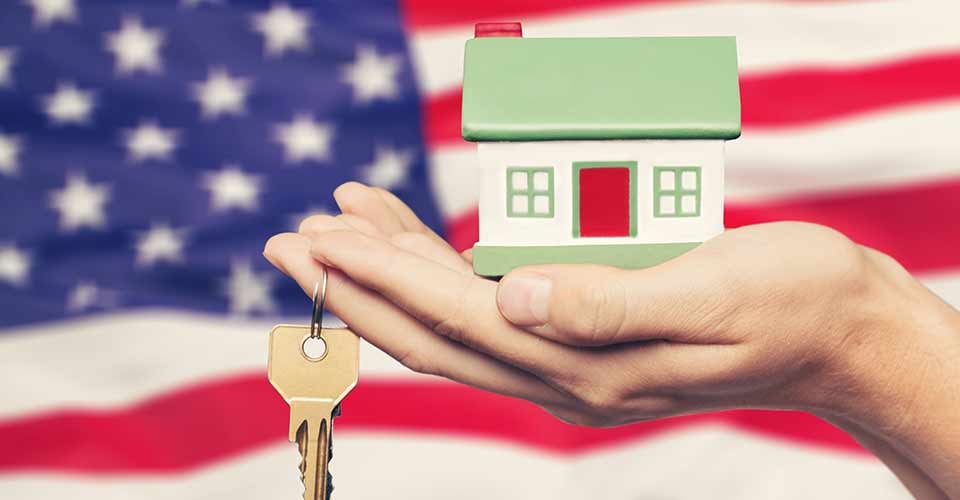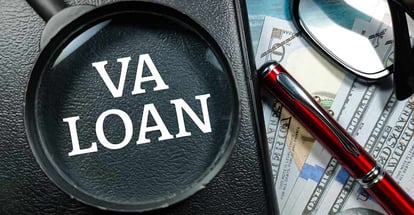The Florida VA Home Loan Process: Start to Finish
So how does the VA home financing work? And what are the underwriting requirements? Read on.
What Is a VA Home Loan?
The VA loan is a unique lending package administered by accredited mortgage financiers and backed by the Department of Veterans Affairs (VA).
The home loan is available for service members on active duty, retired former military members (veterans), and eligible spouses of military members.
What Are the VA's Qualifications for Getting the Loan?
Qualifying for a VA mortgage is easy, provided you meet the VA Department's service requirements.
The basic requirements are as follows:
-
Ninety consecutive days of active military service during wartime.
-
One hundred eighty-one days of active military service during peacetime.
-
Be a spouse of a soldier who died on duty or due to a work-related injury.
- Six years of active service in the National Guard or Reserves.
The VA Loan Process
The process of applying for a VA loan takes many steps. However, if you find a reliable lender and follow the proper steps, getting the loan will take little time.
Here is a step-by-step guide on applying for a VA mortgage.
Find a Suitable Lender
The first step in the loan application is finding a suitable lender. Unlike what many people believe, the Department of Veterans Affairs doesn't offer loans but instead works with lenders to help you get financing.
You, therefore, need not contact the VA directly to apply for the loan. Experts recommend shopping around and talking to at least three lenders to understand their offers, rates, and expertise.
The following key questions will help you determine if you're dealing with a genuine lender:
Does the Lender Have VA Approval?
Not all banks or mortgage companies offer VA loans. Instead, only VA-approved financial institutions can originate the mortgage. VA approval means your preferred lender has the legal authority to collaborate with the VA department to issue loans.
Despite the VA's approval of lending institutions, it doesn't favor selected lenders over others. Therefore, be wary of lenders who claim only they have absolute rights to provide the VA mortgage.
Is the Lender Experienced in VA Mortgage Services?
Some lenders have an all-in-one package that includes VA and conventional mortgages. However, others focus exclusively on issuing VA loan services to military clients.
Your preferred lender must have extensive knowledge of handling VA loan services, so you're assured of professional service.
Evidence of expertise in the field includes clients' testimonials, recommendations, and proof that the lender has been in practice for sufficient time.
What Are the Lender's Offers?
Lenders have different offers on interest rates and levels of financial coverage. You should ask what the lender offers, so you have a smooth ride from the start to the end of the loan application process.
Fill Out an Application Form
Once you've found a suitable lender to work with, it is time to fill out an application - a formal request to the lender that you're interested in a mortgage package.
Most lenders have online request forms where you can provide the required information without physically visiting their offices.
Provide a Certificate of Eligibility (COE)
A Certificate of Eligibility proves you meet entry qualifications for the VA loan financing. It also helps the lender determine the loan amount the Department of Veterans Affairs (VA) can guarantee you. The COE is, therefore, a vital document during the mortgage application process.
The certificate is available online through an approved lender's portal or the ebenefits section of the VA Department. You can request the COE directly online or by emailing the Department of Veterans Affairs.
However, the easiest option is to let the lender search it for you using your date of birth or social security number.
Obtain Loan Pre-approval
Loan pre-approval isn't mandatory but is crucial in convincing the lender that you're ready and willing to close the lending agreement successfully.
It also helps you understand what you can comfortably pay after obtaining the loan. The pre-approval process also reveals grey areas that require improvement, including debt-to-income ratio and credit score.
VA loan pre-approval typically involves verifying your credit history and financial information.
It is a perfect opportunity to negotiate with the lender about your income, employment status, and other factors affecting your chances of getting the loan.
Once you finish the loan pre-approval, the lender will give you a pre-approval letter containing the principal amount they're willing to lend out.
Qualified lenders may require the following documents during the process:
-
A copy of government identification documents such as a driver's license.
-
Two recent paystubs and W2 forms.
-
A statement of service from the service department (if you're still in service).
-
Details of two most recent checking accounts.
-
Disability letter (where applicable).
- A copy of the Guard points statement or DD-214 form.
Search for a Suitable Home
The home search is the most exciting process since it grants a rare opportunity for sightseeing, so you identify your desired home. The home search begins once you obtain a pre-approval letter from the mortgage financier.
Some specialized homes offer a perfect fit for VA mortgages than others. Still, VA loans offer massive benefits that most real estate agents understand.
It is advisable to hire a qualified real estate agent during the home search, so you understand how to maximize the benefits of the home purchase.
An important point to remember when looking for a home is that VA home requirements are similar to those of other government-backed mortgages.
For instance, you can only use the loan to buy a primary residence, not commercial property or a second home. Moreover, you can buy a multi-unit home (up to four units), provided you'll occupy the home as a primary residence.
Make an Offer
Once you find a suitable home, you're ready to make an offer to the seller. The real estate agent will help you draft a compelling offer to buy the house.
What should you consider when drafting the offer? First is the price of homes within the neighborhood. The realtor will evaluate the recent prices of homes within the area, so you have a starting point for the purchase price. Your purchase price should be within the range of the local home prices.
Besides the local home prices, you should also consider the closing costs. Typically, mortgages have accompanying closing costs, and VA loans aren't an exception.
An offer also includes contingencies and VA appraisal protection. For instance, if some important processes must be finished before the loan closes, you may specify their timelines. Such include home appraisal and repairs following the appraisal.
Similarly, the offer should have an escape clause allowing you to exit the contract without financial implications. For instance, assuming the appraised value is lower than the market price, you can pull out of the sale agreement. In such instances, you should agree with the seller on the refund policy for the price you'll pay.
Once you draft the offer, you can submit it to the seller and sign a purchase and sale agreement. You may agree on a standard negotiation period before finally striking a deal.
Home Appraisal
The VA mortgage doesn't have stringent requirements regarding a home inspection. However, a home appraisal is necessary to determine the condition of the residence. The Veterans Affairs Department will send an authorized appraiser to assess its condition.
Generally, the home should be in good condition and satisfy the stipulated minimum property requirements. If the home doesn't meet the minimum property requirements, the appraiser may recommend repairs before closing the loan application process. Either you or the seller will cover the cost of repairs, depending on your agreement.
However, if the home satisfies the minimum property requirements, an underwriter will append a stamp of approval on the property, paving the way for its purchase.
Wait for Loan Underwriting
Loan underwriting is one of the final yet essential steps in the VA mortgage application. Loan underwriting begins when you upload your documents and purchase contract on the lender's portal.
The lender will then assign underwriters and processors to verify the information you submitted. You can then sit back and wait patiently as the underwriters approve your VA loan.
Obtain a Closing Disclosure
The loan closing is the final step in the mortgage application process. During the loan closing, the property officially transfers from the seller to you.
Before then, the lender will issue a closing disclosure highlighting the total closing costs for the property. The closing disclosure also contains the loan repayment terms and expected monthly repayments.
You can compare the final closing estimates with the loan estimates indicated on the pre-approval letter. You can also ask for clarification if anything isn't clear on the document.
During the closing, the lender may also ask final questions about your income and ascertain whether you can pay the loan. You'll then receive a 'clear to close' order, allowing you to schedule a suitable closing day.
Become a Homeowner
The loan closing typically requires you to offset the closing costs. A one-time VA funding fee (0.4%-3.6%) is also required to support the VA loan program.
Once you clear the payment, you're only a step away from becoming a homeowner. The real estate agent may take you through a final sight-seeing of the property you wish to buy so you ensure the recommended repairs are satisfactory. Finally, you'll sign the closing documents and become a new homeowner.

VA Loan Interest Rates
The veterans' affairs department doesn't determine the interest rates charged on VA loans. Instead, banks, credit unions, and other financial institutions set their lending rates.
However, due to backing from the Federal government, VA loan rates are relatively lower than that of conventional mortgages.
The following factors will determine your VA loan rate:
-
Mortgage Duration - You may opt for a 15-year or 30-year loan term, depending on your agreement with the lender. A 15-year term has higher monthly premiums, a shorter duration, and a lower interest rate. On the other hand, a 30-year term has smaller monthly premiums and a higher interest rate since the risk of default is significantly higher.
-
Credit Score - The Department of Veterans Affairs doesn't have a minimum credit score for borrowers to get a loan. However, private lenders have minimum credit score limits required to obtain the loan. Although credit score requirements vary, most lenders require a minimum score of 620 to get a VA mortgage.
-
Type of Loan - There are five broad categories of VA mortgages - Jumbo loans, Renovation loans, Refinance loans, Energy efficient loans, and Interest Rate Reduction Loans. The interest rates can vary depending on the loan product you choose.
- Market Conditions - The prevailing economic conditions in the mortgage market have a direct impact on loan interest rates. For instance, if the Federal Reserve sets a high fund rate, banking institutions will borrow money at a higher rate. The mortgage interest rates will also rise to compensate for the high federal fund rate.
Benefits of VA Mortgage
A VA mortgage offers incredible benefits not found in conventional mortgages. Due to its massive advantages, the mortgage is an excellent choice for many veterans and service members looking for a home.
The VA mortgage offers the following benefits:
Zero Down Payment
The down payment exemption is the most significant benefit of taking a VA Mortgage. You can get the loan without a single upfront payment if you meet the VA's requirements.
The zero down payment clause is a plus if you wish to buy a home without spending much time-saving cash for a down payment.
No Private Mortgage Insurance (PMI)
When taking a conventional mortgage, lenders will require you to pay PMI if your down payment is less than 20% of the total home price. The PMI protects your lender against financial loss if you don't honor their loan obligations.
However, unlike conventional mortgages, the VA mortgage doesn't require payment of PMI. Instead, the government backing cushions lenders against financial losses if a borrower fails to pay the loan.
Flexible Credit Requirements
VA mortgage financiers use reliable credit score benchmarks to determine the risk of loan default. If your credit rating implies a higher default risk, the lender may require you to have a higher credit score.
However, the credit score required for the VA mortgage is still cheaper than that required for a conventional mortgage.
Lifetime Benefit
VA mortgage offers lifetime benefits to the borrower, implying that you can use the loan benefit repeatedly over many years.
And what's more, if you have a current outstanding mortgage, you can still apply for the mortgage and buy a home if you're relocating to a new duty station.
Attractive Interest Rates
VA loans have the lowest interest rates in the mortgage market. Imagine an interest rate of 0.5%-1% lower than a conventional mortgage. That's an excellent deal, especially if you want to save extra cash over the loan duration.
Regulated Closing Costs
All mortgages have closing costs, and the VA loan isn't an exception. The difference, however, is that the Department of Veterans Affairs has stringent safeguards to cushion you against exploitation by unscrupulous lenders.
A good example is the seller concession option, where you can ask the property owner to cover the closing costs up to 4% of the total costs.
No Prepayment Penalty
Conventional mortgages have a prepayment penalty if you clear the balance before the agreed time. The prepayment penalty lets the lender recover the interest payments missed when you shorten the repayment period.
The VA mortgage, however, doesn't have prepayment penalties. You can clear your loan balance anytime without worrying about any penalty.
Final Thoughts - VA Mortgage Process
Getting a VA mortgage is easy, provided you meet the VA's service requirements. In addition, following the proper steps will help you find a suitable loan product for your needs without much hassle.
First, identify an approved lender, then provide a certificate of eligibility. You can then seek a loan pre-approval, search for a suitable home, make an offer, and present a signed purchase agreement. You'll then submit the required underwriting documentation, which allows you to become a homeowner when approved.
Contact an approved VA lender if you're ready to kick-start the process.
With over 50 years of mortgage industry experience, we are here to help you achieve the American dream of owning a home. We strive to provide the best education before, during, and after you buy a home. Our advice is based on experience with Phil Ganz and Team closing over One billion dollars and helping countless families.

About Author - Phil Ganz
Phil Ganz has over 20+ years of experience in the residential financing space. With over a billion dollars of funded loans, Phil helps homebuyers configure the perfect mortgage plan. Whether it's your first home, a complex multiple-property purchase, or anything in between, Phil has the experience to help you achieve your goals.


 By
By  Edited by
Edited by 






